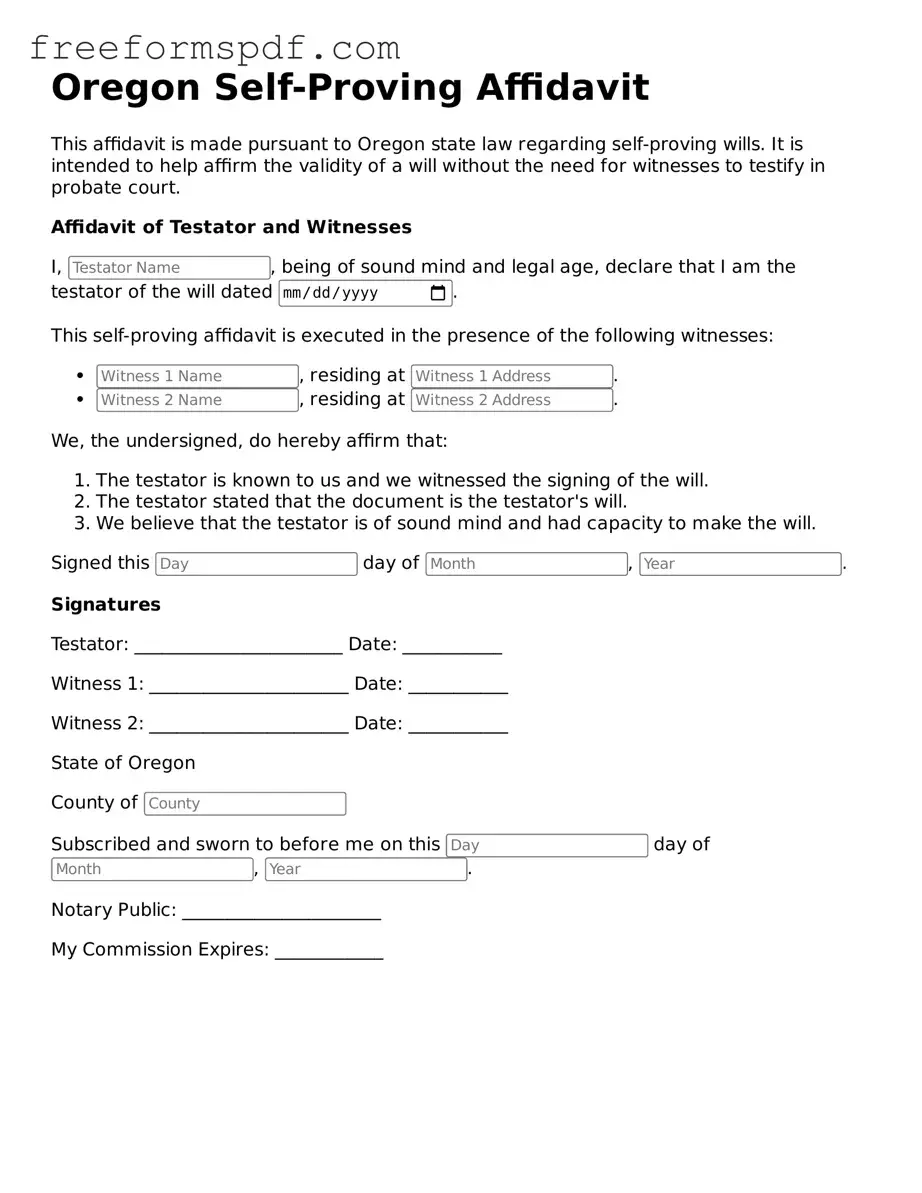Attorney-Verified Self-Proving Affidavit Document for Oregon State
Common mistakes
-
Not including all required signatures: The affidavit must be signed by the testator and two witnesses. Omitting any of these signatures can invalidate the document.
-
Failing to date the document: The affidavit should include the date it was signed. Without a date, it may create confusion regarding the validity of the will.
-
Using incorrect witness qualifications: Witnesses must be at least 18 years old and not named in the will. Choosing witnesses who do not meet these criteria can lead to complications.
-
Not completing the form in the presence of witnesses: The signing of the affidavit should occur in front of the witnesses. If this step is skipped, the affidavit may not hold up in court.
-
Neglecting to provide clear identification: The identities of the testator and witnesses must be clearly stated. Ambiguities can lead to disputes about who signed the document.
-
Inaccurate or incomplete information: All sections of the affidavit must be filled out accurately. Missing or incorrect details can undermine the entire affidavit.
-
Not keeping copies of the affidavit: It is crucial to retain copies of the signed affidavit for future reference. Without copies, proving the validity of the will may become challenging.
Learn More on This Form
-
What is a Self-Proving Affidavit in Oregon?
A Self-Proving Affidavit is a legal document that allows a will to be accepted in court without requiring witnesses to testify about its validity. In Oregon, this affidavit is signed by the testator (the person who made the will) and witnesses, confirming that they witnessed the signing of the will.
-
Why should I use a Self-Proving Affidavit?
Using a Self-Proving Affidavit can simplify the probate process. It can save time and money by eliminating the need for witnesses to appear in court. This is especially helpful if witnesses are unavailable or if their memories of the event are unclear.
-
How do I create a Self-Proving Affidavit?
To create a Self-Proving Affidavit, you need to have your will signed in front of at least two witnesses. After signing, you and the witnesses will complete the affidavit, which includes statements affirming the validity of the will. It's advisable to consult with a legal professional to ensure that the affidavit meets all requirements.
-
Is there a specific form I need to use?
Yes, Oregon has a specific form for the Self-Proving Affidavit. You can typically find this form through the Oregon Secretary of State's website or through legal resources. Make sure to use the correct version to ensure it complies with state laws.
-
Can I revoke or change a Self-Proving Affidavit?
Yes, you can revoke or change a Self-Proving Affidavit. If you create a new will or make significant changes to your estate plan, you should also update your Self-Proving Affidavit accordingly. Always ensure that any new documents are properly signed and witnessed.
-
What happens if I don't use a Self-Proving Affidavit?
If you don’t use a Self-Proving Affidavit, the court may require witnesses to testify about the will's validity during probate. This can complicate and prolong the process, especially if witnesses are hard to locate or if there are disputes about the will.
Misconceptions
The Oregon Self-Proving Affidavit is a useful legal tool for individuals creating a will. However, several misconceptions surround its purpose and function. Here are four common misunderstandings:
- Misconception 1: The Self-Proving Affidavit is mandatory for all wills in Oregon.
- Misconception 2: The Self-Proving Affidavit can be completed after the will is signed.
- Misconception 3: The Self-Proving Affidavit guarantees that the will cannot be contested.
- Misconception 4: Anyone can draft a Self-Proving Affidavit without legal assistance.
This is not true. While a Self-Proving Affidavit can simplify the probate process by validating a will without the need for witnesses to testify, it is not a requirement. A will can still be valid without this affidavit.
This is misleading. The affidavit must be signed at the same time as the will, in the presence of a notary and witnesses. Completing it later may not provide the intended legal benefits.
This is incorrect. While the affidavit can make it more difficult to challenge a will, it does not provide absolute protection against disputes. Heirs or interested parties may still contest the will on other grounds.
While it is possible to create one without a lawyer, seeking legal advice is recommended. A qualified attorney can ensure that the affidavit meets all legal requirements and aligns with the individual's intentions.
Some Other Self-Proving Affidavit State Templates
New York Will Requirements - Beneficiaries may appreciate the clarity this affidavit provides in validating a will.
The New York Certificate form is not only vital for establishing a corporation in New York State, but it also serves as a gateway to various resources and templates that can assist with the incorporation process, such as those available at NY Templates.
Self Proving Affidavit Texas - The affidavit serves to establish that the will was made voluntarily by a competent individual.
Self-affidavit - It serves as a safeguard against future disputes regarding the will's authenticity.
